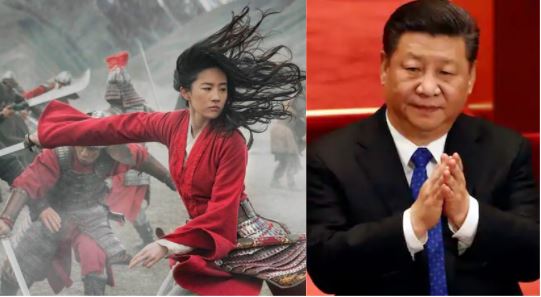Disney’s ambition to churn another billion-dollar movie franchise has been snapped into dust much like the way Avengers were snapped out of reality in the Infinity War. The live-action remake of the hit animated series by the same name was a calculated bet by Disney to rake the moolah in the big market of China. However, the recent string of controversies attached to the movie and its lead actress has led the common Chinese folks to snub the movie.
Reported by TFI, within a few days of release in the Western markets, the movie had garnered heavy controversy as it was filmed in Xinjiang, the Chinese province where the Uyghur minority is being “re-educated” (a euphemism for genocide) in the concentration camps.
The credits of Mulan specifically thank the Publicity Department of the Chinese Communist Party’s Xinjiang Uighur Autonomous Region Committee, as well as the Public Security Bureau in the city of Turpan and other state entities there.
The Public Security Bureau (PSB) is one of the main forces administering the internment camps, enforcing the surveillance and interrogation of Uyghur Muslims. The PSB members force Uyghurs into slave labor and demand that Uyghur women procreate with Han guests employed by the government to spy on them. Massive sterilization camps are organised by PSB. Despite the malevolence of the PSB out in the public domain, Walt Disney shamefully gave them credit in the movie and invalidated the lives of millions of Uyghur Muslims who are constantly living in the fear of death.
Seeing the backlash, even the Chinese authoritarian regime has distanced itself from the movie. According to Reuters, the Chinese authorities have told major media outlets not to cover Walt Disney Co’s release of “Mulan”
In a lengthy editorial published in CCP’s mouthpiece, Global Times, the Chinese state media sidestepped the Xinjiang controversy and stated that the movie failed to depict the real story of China and therefore bombed at the box-office.
“Instead of a Chinese story, it may be more appropriate to call it a Disney princess story, such as Frozen,” Yun Feiyang, a Chinese movie critic with more than 1.51 million followers on China’s Twitter-like Sina Weibo, told the Global Times.
The mouthpiece desperately tried to play down the real controversy of the movie by uttering: “The unpopularity of the film has nothing to do with the West’s defamation, which the Chinese audience do not care about. It is just the poor art level it showcases and misunderstandings of Chinese culture that disappointed the market.”
The movie was wildly publicized in China and therefore its bombing on the box-office is not because of the weak script or misappropriation of the Chinese culture, it’s because the native Chinese, who have begun to hear about the atrocities being inflicted by its red-regime on the millions of Uygur Muslims, have consciously avoided watching the movie, as a way to show their dissent.
The clampdown on the Uygurs and the minorities has become a hallmark of the Xi Jinping regime and despite its massive censorship drives, the common folks are starting to talk about its government’s barbarity in a hush-hush tone.
The controversy around the film and its boycott in the Western world reached another level when the users discovered a social media post from the lead actress Liu Yifei justifying police brutalities in Hong Kong and China’s imposition of National Security Law. “I support the Hong Kong police. You can all attack me now. What a shame for Hong Kong” posted Liu in August 2019.
The pro-democracy activists in Hong Kong have urged to boycott the movie and Disney studios. “Because Disney kowtows to Beijing, and because Liu Yifei openly and proudly endorses police brutality in Hong Kong, I urge everyone who believes in human rights to #BoycottMulan,” Hong Kong activist Joshua Wong tweeted.
But the question begets—why Disney took such a hara-kiri decision to make a movie that bombed so epically even at the Chinese box-office? The answer lies in a report by Pen America where it has been iterated that Hollywood moguls, writers, and producers are changing scripts, deleting scenes, and recasting actors only to gain access to the 1.4 billion strong Chinese markets. China is the big cash-cow and wooing it means, raking in quick and easy cash.
And with a market-access to Hollywood studios, the Chinese government has started using these culturally influential studios as a Chinese propaganda tool. The scriptwriters, directors, and production studios are forced to paint China and the Chinese government in a good light in the fear of getting banned by the Chinese government.
Even from a conventional storytelling perspective, Mulan is a bewildering, choppy mess. It cuts from scene to scene with very little logic or thematic coherence, mechanically working just to push the Chinese agenda.
If the Xinjiang controversy hadn’t reached to the levels it has now, the CCP regime would have easily whitewashed the reality and painted the region as a beautiful, serene countryside that is brimming and blossoming with life.
However, even Xi Jinping could not have predicted that his own people would boycott the movie on such a large scale. The elaborate PR stunt of China has gone haywire and Hollywood, its accomplice in the endeavor, once again stands exposed.




























